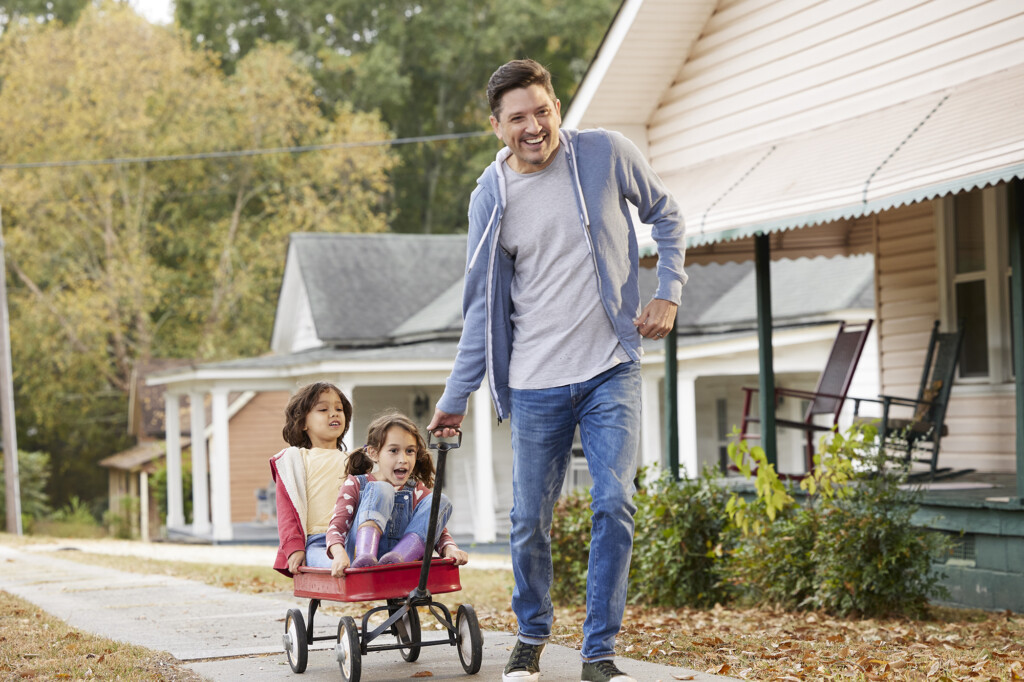Four Ways Supporting Homeownership Can Help Break the Cycle of Poverty

Improve the whole health of Georgians through financial education and empowerment.
For many people, the American dream of home ownership represents a significant milestone in their lives. A March 2022 survey published by Bankrate.com, a leading financial services company, revealed that 74% of Americans ranked homeownership as the number one measure of prosperity - higher than a career (60%) and a college education (35%).
Unfortunately, for many Georgians, that dream is well out of reach. The median hourly wage in Georgia is around $18.43, which is nowhere near enough to qualify for a mortgage in our state, where the average price of a home is $345,000.
As the wealth divide in our country continues to widen, more experts are looking for ways to increase access to affordable housing to break the cycle of poverty for low-income families. Decades of research by health care professionals, economists and social scientists have directly linked homeownership to financial success and positive physical and mental health. They have proven that ready access to the five domains of the social determinants of health - economic stability, health care, education, housing, social/community connection - all have an impact on our wealth, health and quality of life.
As a nationally recognized leader in managed care, CareSource has made it a priority to identify and implement innovative strategies to help more Georgians own a home. We believe affordable housing is the key to preventing intergenerational poverty, increasing opportunities to build wealth, and improving mental and physical health.
That belief and vision is why we provide our members with free access to a comprehensive financial literacy program through Atlanta Habitat for Humanity (AHFH) and Coastal Empire Habitat for Humanity in Savannah. Our partnership with these organizations allows CareSource members to participate in in-depth financial education programs and confidential one-on-one coaching sessions to help them set (and hopefully) achieve savings goals, as well as plan and implement strategies to improve their financial health - all with the goal of home ownership.
Here's how these programs can break the cycle of poverty:
-
Homeownership builds wealth
Homeownership is one of the most effective and reliable ways to build wealth for two important reasons: increased ownership equity in your home and the price appreciation of the home. Monthly mortgage payments act as a kind of forced saving mechanism, with each payment increasing your equity in your home, which in turn allows you to realize higher proceeds if the house is sold. Additionally, home values generally increase over the course of a 15- or 30-year mortgage, which provides the owner with another source of wealth if the home is sold.
-
Homeowners typically spend less on housing costs
Affordable housing helps owners spend less of their hard-earned money for shelter. U.S. Census data shows that 42% of renters who earned $50,000 a year spent more than half of their income on housing. In comparison, most banks require that borrowers pay no more than 20% to 30% of their income on their mortgage. Lower mortgage payments free up homeowners to allocate more money on health care, food and, if possible, saving for retirement or for college for their children. Also, with a fixed-rate mortgage, homeowners know exactly how much of their income goes toward paying off their housing debt, which is invaluable when managing the family budget.
-
Stable, affordable housing can help improve your children's education
There is a growing body of research that links affordable, stable housing with improved educational outcomes for children. One study found that children from low-income households who move more than once during their early elementary school years had lower math and reading achievement scores. The data also showed that children who read below the third-grade level are more than six times more likely to drop out of school than their peers.
-
Affordable housing can enhance economic growth and development
One more point: Increased investment in affordable housing is simply good business for our local communities and our state. Access to quality, affordable homes improves the attractiveness of a community to workers. And the increased disposable incomes of those residents - and rising property values - attract business owners (restaurateurs, retailers, grocery stores, health care providers) to serve the growing needs of the community.
Most of us have heard the adage “knowledge is power.” By providing our members with financial literacy programs and education, we can empower more Georgians to achieve the goal of home ownership, break the cycle of poverty, and build a secure financial future for themselves and future generations.
This article originally ran on Georgia Trend.
Explore more real stories about how we've made a positive impact on the lives of our members.
